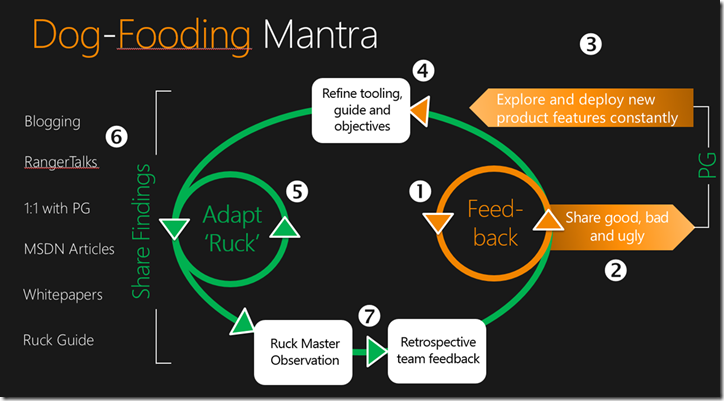ALM Rangers Dogfooding – Epics are being assimilated into Features
During 2010 we introduced Epics to the ALM Ranger “Ruck” process model to define the value proposition, elevator pitch and the team collaboration story. In essence it is an intent container for product backlog items and associated tasks.
Back then … we had an Epic
As part of the continuous 24x7 dog-fooding of Ruck and the Team Foundation Service the “Epic” became a first-class citizen of backlogs, queries, documentation and even the CodePlex projects housing the final deliverables as shown.

Essentially we simulated an Epic – User Story | PBI – Task relationship by prefixing PBI’s with Epic and creating queries that look for the string within the WI title. Not a very elegant or fool-proof solution, but it has served us well over the past few months.
Part of our dog-fooding mantra is to (1) share feedback transparently, (2) constantly bombard the product teams with candid feedback, (3) embrace new features as they emerge. We (4) refine out ecosystem, guidance and dog-fooding objectives, (5) adapt Ruck as used by one or more Ranger project teams and (7) analyse the impact. If productivity and quality is improved, we assimilate the features our Ruck process.
Welcome Feature, goodbye Epic
To cut a long story short, we have just entered step (4) again and are embracing Agile Portfolio Management and features as outlined in one of Brian Harry’s latest Visual Studio 2013 post and the TechED 2013 demo with Brian Keller.
PS: Read the Excuse me sir, your cow is stuck in the mud post one as well while you are at it ![]()
The plan is to use the Feature in place of an Epic, allowing us to drop the usage of explicit title prefixes and custom queries.
- The ability to view the Backlog Items from a Feature or Task level is huge productivity bonus we will get from using the “out-of-the-box” feature

- We will also no longer have Epics polluting our Backlog statistics and vice versa.
- Eventually we can discontinue and remove our custom queries to support Epics … when the last Epics goes to Done state.
Dealing with State and GO, GO, GO
With Epics, the Product Owner (PO) used to set the state to Approved when happy for the team to proceed and the team would set to committed when embracing the Epics.
With Features, the Product Owner sets the state to In Progress when happy for the team to proceed and the team creates child User Stories/PBIs set them to committed when embracing the Features.
Watch the space for feedback on our dog-fooding evaluation and the teams getting to grips with the new work item type, states and visualisations.
What’s Next?
- We will be updating our Practical Ruck Guide to accommodate the Feature and migration away from Epics and as discussed, we will dog-food the changes with the next wave of Ranger projects starting in July.
- Our esteemed Ruck Master, Brian Blackman, will soon be releasing an update to the Ruck video to give context, an overview and demonstrate the new “feature”.
Related content
- Dogfooding journal of the Team Foundation Service
- How the ALM Rangers are using Visual Studio ALM … in a practical nutshell
- Code Review and Build process
- What is a silent release?
- When do the ALM Rangers [not] ship source code
- Let us talk about “Quality Bars”
- Raising the Quality Bar for Tooling
- Dealing with bugs on tfs.visualstudio.com
- Proving the new process and lifting the last confusions (we hope)
- Pondering over documentation
- Ruck and the new TLAs
- The age of the visual board
- Dogfooding and the “Angst” Factor
- Solution types and a practical walkthrough of the Quick Response concept



